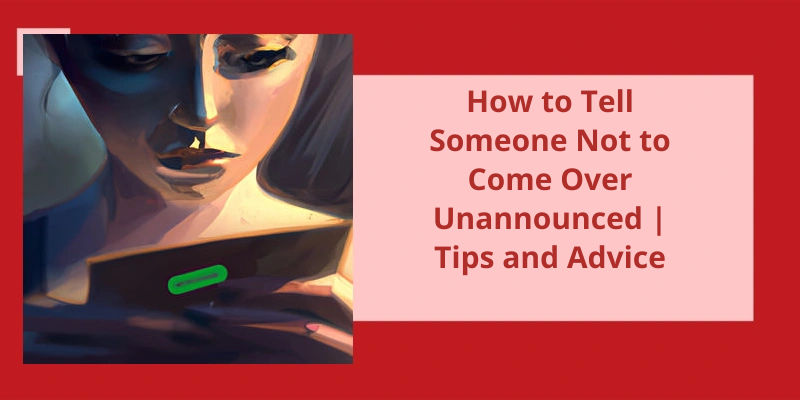As adults, we all cherish our privacy and personal space, and we value our routines and schedules. However, there are times when someone may come knocking on our door unannounced, without any prior warning or invitation. While we may be glad to see our friends and family, unexpected visits can be stressful and disruptive, especially if we’re in the middle of something or don’t feel like hosting guests. Thus, learning to say no to uninvited guests is an essential skill, and one that can help us establish healthy boundaries and maintain our mental health and well-being. So, how do we tell someone not to come over unannounced without offending them or hurting their feelings? The key is to be honest, direct, and polite, and to set clear boundaries and expectations. So, let's explore some ways to navigate this tricky situation with grace and tact.
How Do You Politely Say No to Someone Coming Over?
When someone asks to come over but youre not up for it, it can be tricky to politely decline without coming off as rude. A few tips can make all the difference when it comes to navigating these social situations. Firstly, be concise and clear with your response. You don’t need to give lengthy explanations or justifications for why you cant have company right now. Simply state that youre not able to have guests over and leave it at that.
Killing them with kindness is another way to politely say no. You can express gratitude for their interest in stopping by, but let them know that now isn’t a good time. Being polite and respectful goes a long way in maintaining good relationships with friends, family members and acquaintances.
If they ask for reasons for your refusal, you can offer some vague reasons without opening up the dialogue too much. Saying that youre not feeling well or that you’ve some work or personal issues that need your attention can help alleviate any hard feelings. But it’s important to stick to your decision without giving an opening to revisit the request.
Keeping the door open is another way to say no politely. Letting them know that youre open to seeing them in the future, but now isn’t a good time, can help keep the relationship cordial and respectful. Making it clear that youre not available at this time, but that youre looking forward to seeing them soon can help ease any potential discomfort.
Refer them to an alternative is another way to be polite. If you cant have them over, maybe there’s another place or activity that they’d enjoy that you can suggest. Giving them a viable alternative to hanging out at your place can help show that youre still interested in spending time with them, but just not in the way they requested.
Understanding peoples strategies is also important to navigate these situations. If you know someone who demands constant attention, then it’s important to be firm and consistent in your boundaries. On the other hand, those who’re sensitive to rejection may need some extra reassurance that your decision isnt personal. Tailoring your response to the individuals needs can go a long way in maintaining a good relationship.
Saying no when you don’t have time isn’t always easy, but it can be done politely and respectfully. By being concise and clear, killing them with kindness, providing some reasons without opening up the conversation, keeping the door open for the future, suggesting an alternative, or understanding peoples strategies, you can maintain your relationships and honor your boundaries.
Techniques for Saying No Assertively but Respectfully
- Rehearse your response before saying no.
- Use “I” statements to express your opinion.
- Be clear and direct in your communication.
- Acknowledge the person’s request and offer an explanation or alternative solution.
- Practice active listening and empathize with the person’s position.
- Use positive language and express appreciation for their consideration.
- Stay calm and assertive in your demeanor.
- Avoid making excuses or lying to avoid the request.
- Remember that it’s okay to say no and set boundaries for yourself.
During these unprecedented times, maintaining social distancing has become more important than ever. However, there may be occasions when someone fails to maintain a safe distance and encroaches on your personal space. In such situations, it’s important to know the right way to ask them to back off without causing any offense or discomfort. Body language expert, Setliff, suggests using polite and simple phrases to convey your message effectively. Read on to learn more about effectively enforcing social distancing.
How Do You Tell Someone to Backoff?
The current pandemic has made social distancing a paramount concern for everybody. While most people understand the importance of maintaining a certain distance from others, there are always individuals who fail to take this into consideration. If you encounter someone who’s standing too close for comfort, you may need to find a polite, yet firm way to make them back off.
The first step in telling someone to backoff is to remain calm and composed. It can be easy to become frustrated or angry, but reacting in this manner will only escalate the situation and make it more difficult to resolve. Instead, take a deep breath and approach the situation with a level head.
Once you’ve gathered your thoughts and emotions, it’s time to communicate your boundaries clearly and firmly. Using phrases like “Excuse me,” “Im sorry,” or “Would you mind” can be useful in setting a respectful tone for the conversation. Make it clear that youre not trying to be rude, but that you need to step back for your own safety and that of others around you.
It’s important to remember that you’ve the right to set boundaries and protect your personal space. If the person refuses to back off, it may be necessary to take more direct action, such as firmly telling them to step away or moving to a different location.
In some cases, it may be helpful to enlist the help of someone else to communicate your boundaries. For example, if you feel uncomfortable speaking to the person directly, consider asking a friend, coworker, or store employee to intervene on your behalf.
In all cases, remember that confronting someone who’s standing too close can be an uncomfortable or even scary situation. Dont be afraid to seek support from others and prioritize your own well-being and safety.
How to Deal With Someone Who Continually Ignores Your Request for Personal Space
If you’re being ignored when you ask for personal space, it’s important to be firm and persistent. First, calmly and explicitly communicate your boundaries to the person and explain why they’re important to you. If they continue to ignore your request, consider limiting your interactions with them or seeking support from friends or a therapist to help you assert yourself more effectively. Remember that your right to have and maintain personal space is valid and important to your mental and emotional wellbeing.
It can be difficult to communicate with others when we want them to stay away, particularly when the encounter requires sensitivity and caution. However, it’s crucial to remember that we’ve the right to set boundaries for ourselves, and communicating them effectively can be the key to keeping ourselves safe and secure. So, if you find yourself in a situation where you need to tell someone to keep their distance, there are some effective and polite ways to do so.
How Do You Politely Tell Someone to Stay Away?
Rather, be direct and concise in your communication. For instance, you could say something like, “I appreciate your concern, but I’d prefer to deal with this on my own,” or “Im not interested in pursuing a relationship with you right now, and I’d appreciate if you could respect my space.”
When telling someone to stay away, try to remain calm and composed. Avoid using aggressive or accusatory language, as this can escalate the situation and make matters worse. Instead, be firm but polite, and make it clear that you aren’t in the mood for conversation or interaction at the moment.
It’s important to set boundaries with others, especially if their behavior is making you feel uncomfortable or unsafe. If someone isn’t respecting your personal space or boundaries, it’s okay to tell them to leave you alone. Remember that you’ve the right to say no and to protect your own emotional and physical well-being.
In some cases, it may be necessary to involve outside help, such as a supervisor, teacher, counselor, or law enforcement. Dont be afraid to reach out for assistance if the situation becomes more serious or if you feel that you’re in danger. Remember that there are people who can help you, and that you don’t have to face challenges alone.






